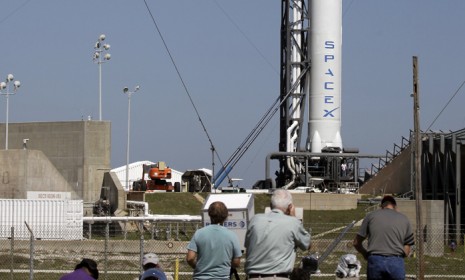SpaceX's historic launch: By the numbers
On Tuesday the first privately owned spacecraft ever will (again) attempt to blast off and deliver goods to the International Space Station

A free daily email with the biggest news stories of the day – and the best features from TheWeek.com
You are now subscribed
Your newsletter sign-up was successful
All nine of the Falcon 9 rocket's engines were roaring and ready to blast off on Saturday when a valve malfunction caused SpaceX's computers to pull the plug at the last possible second. The privately-owned, California-based company will attempt a second launch early Tuesday morning at Florida's Kennedy Space Center where, if all goes well, the rocket and attached Dragon cargo capsule will officially begin a two-week trek to the International Space Station (ISS). The mission potentially marks the dawn of a new era for space travel, in which a resource-strapped NASA leans more heavily on the private sector to transport people and supplies to space. SpaceX's swift reaction to the potential catastrophe is to be applauded, says the Wall Street Journal, and "reflects a corporate culture determined to demonstrate confidence and rapid problem solving" — traits some say the noted space agency has been lacking. Here, a look at SpaceX and NASA's big gamble, by the numbers:
Time remaining on the T-minus countdown clock when the launch was abruptly aborted Saturday. "Technicians investigating the glitch discovered a faulty check valve was to blame for the high engine pressure that forced the booster’s engines to unexpectedly shut down," says Space.com.
178
The Week
Escape your echo chamber. Get the facts behind the news, plus analysis from multiple perspectives.

Sign up for The Week's Free Newsletters
From our morning news briefing to a weekly Good News Newsletter, get the best of The Week delivered directly to your inbox.
From our morning news briefing to a weekly Good News Newsletter, get the best of The Week delivered directly to your inbox.
Height, in feet, of the Falcon 9 rocket
80
Percent chance of auspicious weather for Tuesday morning's launch at Cape Canaveral, Fla.
3:44:38
A free daily email with the biggest news stories of the day – and the best features from TheWeek.com
Anticipated launch time in E.S.T.
1,500
Pounds of equipment and supplies (mostly food and clothing) SpaceX's Dragon capsule will transport to the ISS
People actually aboard SpaceX's Dragon. The spacecraft will be piloted remotely by a crew on the ground.
17,000
Miles per hour at which both the spacecraft and the ISS will be orbiting Earth when they attempt to connect
30
Minimum distance, in feet, that the Dragon capsule must be from the ISS to dock. "At that point, flight engineer Donald Pettit, operating the station's robot arm, will lock onto the cargo capsule just after 8 a.m. and guide it to a berthing," says CNET.
$396 million
Development costs for test flights. Tuesday's launch marks SpaceX's third attempt to send a rocket to space, and the first attempt to make contact with the space station.
$1.6 billion
Value of NASA's contract with SpaceX if test flights prove successful
12
Cargo flights which SpaceX will be expected to complete per the contract
$17.7 billion
NASA's proposed budget for 2013. Thought it may appear only "marginally less than last year," says Phil Plait at Discover Magazine, even a slight decrease is bad news for space exploration. "If this budget goes through Congress as is, it will mean the end of a lot of NASA projects and future missions."
Less than 1
NASA's percentage of the U.S. federal budget
Sources: Space.com (2), CNET, Discover Magazine, New York Times, Wall Street Journal
-
 ‘Restaurateurs have become millionaires’
‘Restaurateurs have become millionaires’Instant Opinion Opinion, comment and editorials of the day
-
 Earth is rapidly approaching a ‘hothouse’ trajectory of warming
Earth is rapidly approaching a ‘hothouse’ trajectory of warmingThe explainer It may become impossible to fix
-
 Health insurance: Premiums soar as ACA subsidies end
Health insurance: Premiums soar as ACA subsidies endFeature 1.4 million people have dropped coverage